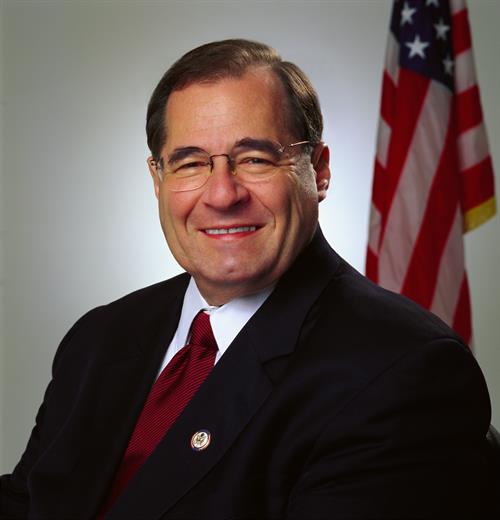
Rep. Nadler on Combating Copyright Infringement
Last week, Congressman Jerrold Nadler (NY-10), the Ranking Member of the House Judiciary Subcommittee on Courts, Intellectual Property and the Internet, delivered an opening statement at the subcommittee’s hearing of “Copyright Remedies.”
“We know that infringement not only damages the financial interests of copyright owners, but our Nation’s economy as well,” said Congressman Jerrold Nadler (D-NY). “There are two basic principles that should guide our consideration of copyright infringement remedies. First, they should serve to deter potential infringers and, when warranted, to penalize criminal infringement efforts. Second, they should compensate a copyright owner for losses resulting from infringement.”
The following is the full text of Congressman Nadler’s opening statement (as prepared for delivery):
“Today we consider the ways in which our copyright laws are enforced and the relief available to copyright holders should someone infringe upon their copyrighted material.
“I – along with all of my colleagues on this Subcommittee – recognize the importance of ensuring that copyright owners have sufficient remedies when their works are infringed. We know that infringement not only damages the financial interests of copyright owners, but our Nation’s economy as well.
“I welcome this opportunity to hear from our witnesses about whether our current copyright infringement remedies are effective and whether or not any changes may be necessary and appropriate at this time.
“As we know, copyright infringement occurs when someone does not obtain authorization or does not have a license to lawfully use copyrighted material and violates one of the exclusive rights given to a copyright owner.
“There are two basic principles that should guide our consideration of copyright infringement remedies. First, they should serve to deter potential infringers and, when warranted, to penalize criminal infringement efforts. Second, they should compensate a copyright owner for losses resulting from infringement.
“Federal law, which governs copyright infringement claims, requires such claims to be brought in federal court. To prevail on an infringement claim, the copyright owner must prove actual ownership over the alleged infringed material and that at least one exclusive right granted to a copyright holder has been violated.
“Current copyright law provides various criminal and civil remedies for copyright infringement, including preliminary and permanent injunctions, as well as statutory damages.
“The Copyright Act, for example, authorizes statutory damages of $750 to $30,000 per infringed work. Willful infringement, however, may authorize the award of damages as high as $150,000 per work. Innocent infringement, on the other hand, may result in the award of damages as low as $200.
“The issue of damages also includes the possible award of attorney’s fees and expenses to the prevailing party, when the court finds such award to be appropriate.
“In addition, the copyright owner may ask the court to enjoin further infringement either temporarily or permanently.
“If a copyright owner elects to pursue statutory damages, the copyrighted work must have been registered with the Copyright Office before the violation started, or – if it is a published work – within 3 months of publication.
“As we examine these issues, we should study whether the penalties for copyright infringement are sufficient.
“We should consider today whether there is a need to clarify that felony infringement includes infringement by streaming. Felony penalties for copyright infringement are currently only available for reproduction or distribution of copyrighted material.
“About three years ago, the Office of the U.S. Intellectual Property Enforcement Coordinator issued a report making several recommendations to Congress that would increase intellectual property protection. Included among these recommendations was a suggestion that the criminal law should be clarified to make infringement by streaming a felony. For example, downloading a copy of the movie Captain America illegally is a felony, but if you were to simply stream the same movie illegally it would only be a misdemeanor. Does this distinction make sense?
“Accordingly, I look forward to hearing the witnesses discuss their thoughts about whether we should amend the law to make it clear that streaming is a distribution of copyrighted works and, thereby, a felony.
“In addition, I understand that some of the witnesses today will argue that the Copyright Act’s statutory damage provisions adequately reflect the two basic principles of deterrence and just compensation.
“Yet other witnesses will likely say that statutory damages have grown to an unreasonably high level in copyright cases and have a chilling effect on innovation.
“Another factor involved in the pursuit of statutory damages is the oftentimes prohibitive cost of asserting a claim for copyright infringement, which can entail extensive litigation. We must ascertain whether the costs to access justice are too high. Individual copyright owners – such as authors, photographers, graphic artists, and illustrators – complain that even when their works are clearly and repeatedly infringed, they simply lack the financial means to fund such litigation.
“These concerns may warrant consideration of whether there should be a streamlined judicial or administrative process to determine infringement claims below certain dollar thresholds. I look forward to hearing from the witnesses about how this process might work best.
“Additionally, some have argued that the registration requirement needed to assert statutory damages places individuals and smaller entities at a disadvantage because it is difficult or burdensome for them to meet the statutory requirement for timely registration. Again, I would like to hear from the witnesses about changes we should consider regarding the registration requirement.
“Whether or not we decide to make changes to statutory damages, increase the penalties for streaming, or set up new administrative processes to handle small copyright infringement claims, depends, in part, on what we hear from our witnesses today. We have an excellent panel before us, and I look forward to their testimonies. I yield back the balance of my time. Thank you.”

